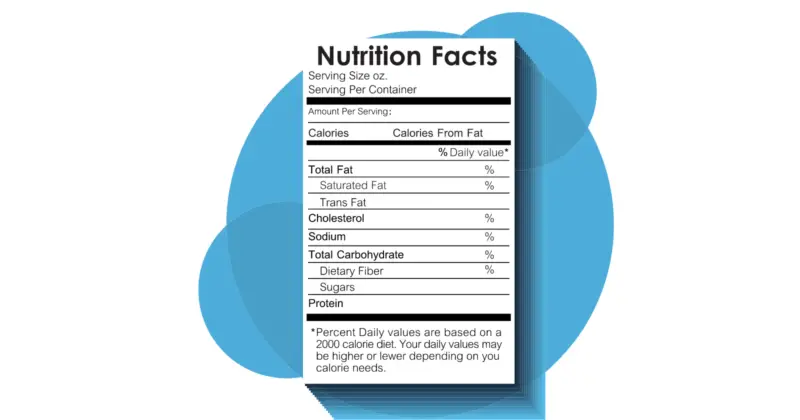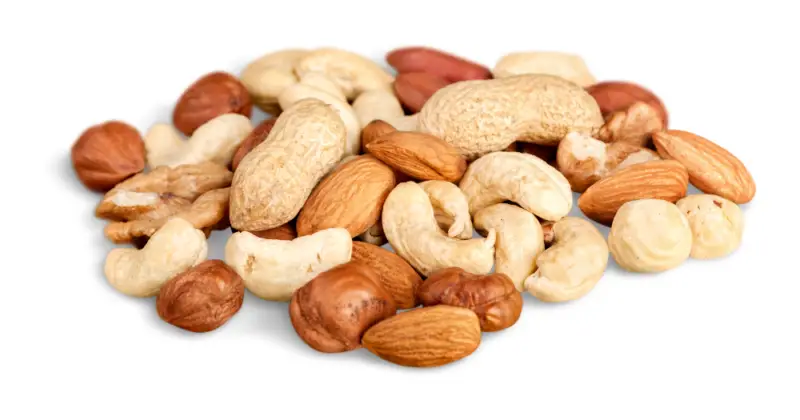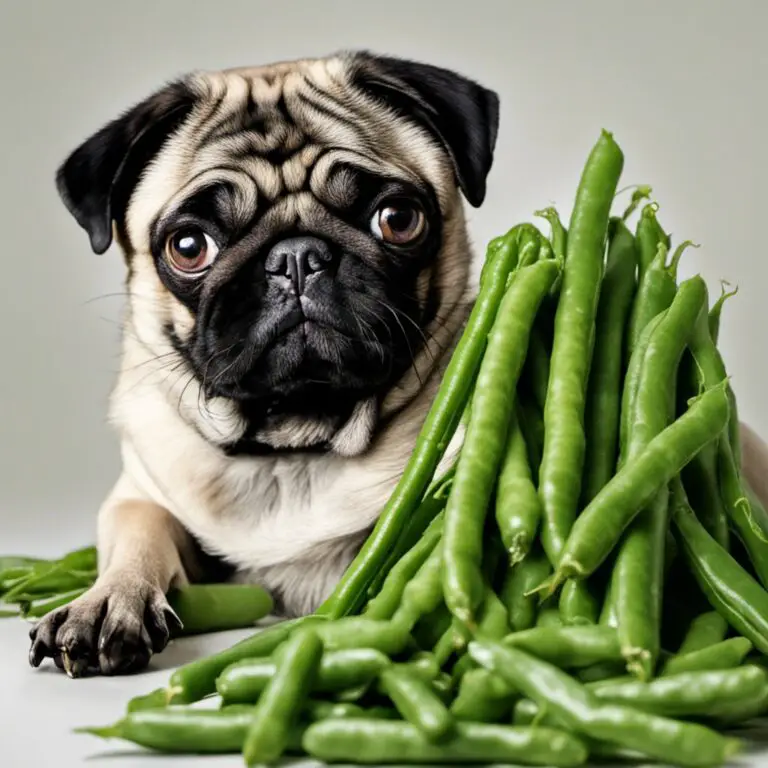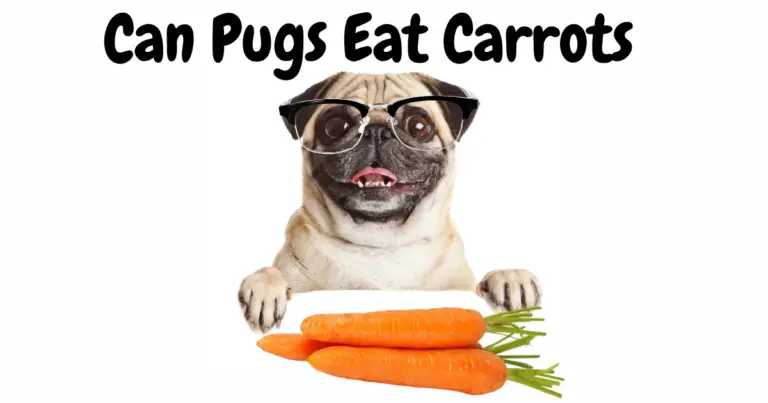Can Pugs Eat Almonds? A Nutty Dilemma Explained

Pugs have unique dietary needs compared to other dog breeds, and as a pug owner, it is important to know what nuts and human foods are safe for your furry companion to consume. Almonds are commonly found in an array of delicious snacks, making it tempting to share them with your pug. However, you may wonder if pugs are safe to eat almonds.

The answer is no; pugs should not eat almonds. While they might not be as toxic as some other nuts, almonds are difficult to digest for dogs, including pugs. Feeding your pug almonds can lead to health issues and should be avoided as there are safer alternatives to offer as occasional treats. Ensuring your pug consumes a well-balanced diet tailored to their unique needs is essential for their overall health and well-being.
Contents
Table of Contents
Understanding Pugs and Their Diet

Pugs are a unique breed of dog, known for their distinctive wrinkled faces and short, bulky bodies. Like any other canine, they require proper nutrition to live healthy and happy lives. A well-rounded diet, tailored to the specific needs of pugs, should include proteins, fats, carbohydrates, vitamins, and minerals.
An example of a high-quality dog food that caters to their specific nutritional requirements is the Royal Canin Breed Health Nutrition Pug Dry Dog Food.
Get The Free Food Eating Guide That Keeps My Pug Happy and Playful Even at 13 Years Old
100% Beginner Friendly & Lists Real Foods Your Pug Can Actually Eat!

Dogs and pugs, in particular, have different appetites and dietary needs than other breeds, which is essential to consider when planning their meals. Monitor your pug’s eating habits to ensure they are maintaining a healthy appetite. A sudden loss of appetite can signal underlying health issues and should be addressed with a veterinarian.
While many dog breeds can safely consume certain human foods, it is important to understand the specific dietary restrictions for pugs. Some foods may cause gastrointestinal distress, including almonds, which can lead to vomiting, diarrhea, and gas in pugs, as the American Kennel Club mentioned.
In addition to commercial dog food, pugs can benefit from incorporating safe fruits and vegetables into their diet. For instance, carrots are a low-calorie, fiber-rich snack that provides pugs with essential nutrients. Including a variety of safe and healthy foods ensures that pugs receive the well-balanced nutrition they need.
It’s crucial to provide pugs with an appropriate diet that caters to their unique needs, as it can significantly impact their overall health. By understanding the specific nutritional requirements of this breed and avoiding potentially harmful foods like almonds, pug owners can help their pets thrive and maintain a healthy lifestyle.
Can Pugs Eat Almonds

Almonds are a common snack for humans, but when it comes to pugs and other canine companions, it’s best to avoid feeding them these nuts. Although almonds are not poisonous to dogs, they do pose several dangers for pugs.
One of the biggest reasons not to feed pugs almonds is their high-fat content. Dogs have difficulty digesting foods with high-fat content, which can lead to pancreatitis and gastroenteritis.
In addition to their high-fat content, almonds can be difficult for pugs to chew and digest, according to the American Kennel Club. Pugs and other dogs often have trouble breaking down and processing almonds, which can lead to stomach issues such as gas, lethargy, and loss of appetite.
Furthermore, almonds pose a choking hazard for pugs, especially if they are given whole. Pugs have a small mouth and throat, increasing the almond’s risk of lodging in their airway. This can lead to a very dangerous situation requiring immediate veterinary intervention.
In conclusion, while almonds may not be as toxic as some other nuts for dogs, such as walnuts and macadamia nuts, they should still be avoided in a pug’s diet due to their potential health risks source. Instead, focus on providing your pug with a well-balanced diet that includes safe foods and treats made specifically for dogs.
Health Impacts of Almonds on Pugs

Almonds are a healthy and nutritious snack for humans and are not recommended for pugs and other dog breeds. The high-fat content in almonds can lead to several health issues in pugs, including obesity and gastrointestinal discomfort. Consuming almonds may cause symptoms such as vomiting and lethargy in some dogs 1.
When pugs indulge in almonds, the risk of choking and intestinal blockages increases. Pugs are particularly prone to choking hazards due to their small size and narrow esophagus. Almond consumption can result in more severe complications, such as intestinal obstruction from undigested fragments of the nuts2.
While almonds themselves don’t contain xylitol, a toxic compound found in some other nuts, they can still cause allergic reactions in pugs. Some pugs may experience symptoms like diarrhea and discomfort, indicating that their bodies are not tolerating the almonds well 3.
Apart from the fat content, salted almonds are especially harmful to pugs. Excessive salt intake can lead to salt poisoning, which presents symptoms such as vomiting, diarrhea, lethargy, and muscle weakness. In severe cases, salt poisoning can be fatal4.
In summary, the high fat content, potential choking hazards, and allergic reactions make almonds an unsuitable treat for pugs.
Nutritional Content of Almonds

Almonds are a nutrient-dense snack that offers numerous health benefits, thanks to their variety of essential vitamins, minerals, and other nutritional elements. They contain a good balance of healthy fats, protein, and fiber, making them an ideal food choice for humans. However, can pugs—and dogs in general—also benefit from consuming almonds?
Almonds are particularly high in protein, providing 6 grams per ounce, which is valuable for supporting healthy muscles, bones, and organs in dogs. They’re also a great source of fiber, with 3 grams per ounce, aiding in digestive health and overall wellness.
When it comes to minerals, almonds pack quite a punch. They provide 37% of the recommended daily intake (RDI) for vitamin E and 32% RDI for magnesium. Vitamin E offers powerful antioxidants that can help support immune function, while magnesium plays a crucial role in nerve and muscle function.
Not only do almonds contain a range of helpful vitamins, but they are also a rich source of beneficial healthy fats. With 14 grams of fat per ounce, 80% of it comes from monounsaturated fats, while 15% is derived from polyunsaturated fats. These unsaturated fats are known for promoting heart health and reducing inflammation in the body.
In summary, almonds are a nutrition-packed food option that delivers a variety of key nutrients essential for maintaining a healthy body. They are particularly high in protein, fiber, minerals, and vitamins, such as vitamin E and magnesium.
Additionally, almonds contain a substantial amount of healthy fats, which can contribute to overall wellness. However, it’s important to note that while such nutritional benefits might be great for humans, different considerations need to be taken into account when feeding them to pugs or other pets.
Can Pugs Eat Almonds? Watch this video
Understanding Almond Varieties and Their Risks
There are different varieties of almonds, such as bitter almonds, Chinese almonds, and sweet almonds. Bitter almonds contain a higher amount of cyanide, which is toxic to both humans and pets. Cyanide can cause respiratory problems and even death if ingested in large quantities. Chinese almonds, often found in traditional Chinese medicine, also contain cyanide and carry similar risks.
Sweet almonds are the type commonly eaten and have a lower cyanide content. Although almonds are not as toxic to dogs as some other nuts, feeding them to your pet is discouraged as they pose potential health issues.
Almond butter may seem like a safer option, but it is still high in fat, which can lead to pancreatitis in dogs. While almond milk is not toxic to dogs, some ingredients found in almond milk, such as added sugar and flavorings, may be harmful. Additionally, almond milk can cause digestive upset in some dogs, so it is not recommended.
Aside from the cyanide content, almonds can harbor mold. This mold poses a risk to dogs as it can result in health issues such as vomiting, diarrhea, and seizures. Furthermore, flavored almonds, which may contain extra salt or spices, are unsuitable for dogs due to their added ingredients.
In summary, while there are various types of almonds available, none of them are considered safe for consumption by dogs. Keeping almonds and products containing almonds away from your pets is essential to ensure their health and well-being.
Potentially Hazardous Nuts and Ingredients for Dogs

Macadamia nuts and pecans are particularly dangerous for dogs to consume. Macadamia nuts can cause symptoms such as vomiting, weakness, tremors, and even hyperthermia. On the other hand, Pecans contain a fungus that can produce a toxin called aflatoxin, which can lead to liver damage in dogs.
Other hazardous ingredients commonly found in human food that should be avoided for dogs include garlic, onions, and chocolate. Both garlic and onions are part of the allium family and can cause toxic reactions in dogs, resulting in gastrointestinal distress, anemia, and organ damage. Chocolate contains an ingredient called theobromine, which is toxic to dogs and can cause symptoms such as vomiting, diarrhea, tremors, seizures, and even death.
When feeding your dog human food, be cautious of any additives that could be harmful. Some examples include artificial sweeteners like xylitol, which can lead to rapid insulin release and hypoglycemia in dogs, or excessive sodium content that can contribute to high blood pressure and other health issues.
Here’s a quick list of potentially hazardous nuts and ingredients for dogs:
- Macadamia nuts
- Pecans
- Garlic
- Onions
- Chocolate
- Additives (e.g., xylitol, excessive sodium)
Keeping these potentially hazardous nuts and ingredients in mind, it is essential to be aware of what your dog is consuming and always provide them with safe and suitable meal choices to ensure their long-term health.
Healthy Alternatives to Almonds for Pugs

Instead of giving almonds to your pug, consider offering them various fruits and vegetables that are safe and nutritious for them. Many human foods can be enjoyed by pugs as healthy snacks, provided they are given in moderation.
Carrots are an excellent alternative as they are low in calories, crunchy, and high in fiber. These can be given raw or steamed, and they can even help clean your pug’s teeth. Similarly, tomatoes can be a nice treat for your pug. However, make sure to remove the green parts like stems and leaves, as they can be toxic to dogs.
Strawberries are another great option for pugs. They provide essential nutrients, such as vitamins B and C, and also support your pug’s immune system. These fruits can help with water retention, which can be beneficial if your pug has a history of bladder or kidney stones.
For vegetable snacks, consider offering green beans or peas. They are a great source of essential vitamins and minerals and can be given either raw or cooked. Just make sure not to add any seasoning or salt to these vegetables.
When giving your pug human food, always consider their size, age, and weight. Puppies may have different nutritional needs compared to adult pugs. However, these snacks should only be a small part of their diet. Make sure to prioritize their regular dry or wet dog food to ensure a balanced diet.
Here’s a list of some healthy alternatives for pugs:
- Carrots
- Tomatoes (without green parts)
- Strawberries
- Green beans
- Peas
Lastly, always supervise your pug when giving them new foods or snacks to make sure they don’t choke or have any issues with windpipe obstruction. By offering your pug these healthy alternatives, you are promoting their overall health and well-being while keeping them satisfied and happy.
What to Do if Your Pug Eats Almonds

If you discover that your Pug has consumed almonds, it is essential to remain calm and take the appropriate steps to ensure their safety. Although almonds are less toxic to dogs than other nuts, they can still risk your pet’s health.
The first step is to closely monitor your Pug for any signs of discomfort or illness. If your dog shows symptoms such as vomiting, diarrhea, or difficulty breathing, it is crucial to seek veterinary advice immediately. Your vet will be able to determine the severity of the situation and recommend the best course of action.
In some cases, a Pug may accidentally ingest a large amount of almonds or develop an obstruction in their esophagus. In these instances, surgery may be necessary to remove the blockage and prevent further complications. Your vet will assess the need for surgery based on your dog’s condition.
If your Pug exhibits mild symptoms or has only consumed a small amount of almonds, they may be treated with medication to alleviate any gastrointestinal issues. Over-the-counter medications, such as antacids or antiemetics, may be recommended by your veterinarian to help prevent further discomfort.
To prevent future incidents, keeping almonds and other harmful foods out of your Pug’s reach is essential. Invest in pet-proof containers or store such items in high, inaccessible places. Educating yourself on what foods are safe for your pet can also help prevent accidents and promote their overall health and well-being.
Conclusion

Almonds are a popular snack for humans, but are they safe for pugs? The answer is not a straightforward yes or no. Although almonds are not inherently toxic to dogs, they can pose several health risks to pugs.
One of the primary concerns is the choking hazard. Almonds can be difficult for pugs to chew, and sometimes they may inadvertently swallow the whole nut, leading to choking. Additionally, the shape and size may cause blockages in the digestive system if not properly broken down. Digestive issues can also arise because dog’s digestive systems struggle to process almonds. This can lead to discomfort, gas, and bloating.
Another problem is that almonds are high in fat and, when consumed in excess, can contribute to weight gain and developing pancreatitis in dogs. Pancreatitis is a severe condition that requires immediate medical attention, as it can be life-threatening if left untreated.
Considering the above risks, it is best not to feed your pug almonds. Far better alternatives provide dogs with essential nutrients without the potential hazards associated with nuts. For example, fruits and veggies like apples, carrots, and sweet potatoes can be great healthy snack options for your pug.
In summary, while almonds are not inherently toxic to pugs, their potential health risks outweigh any minor nutritional benefits they might offer. It is better to seek alternative treats that are safer and better suited to a dog’s nutritional needs. As always, consult with your veterinarian before introducing new foods to your pug’s diet.
Frequently Asked Questions
Are almonds harmful to pugs?
Almonds are not as toxic as some other nuts, but they can still be harmful to pugs. Pugs have difficulty digesting almonds, and consuming them can cause gastrointestinal distress. Almonds are also high in fat, which can contribute to obesity and pancreatitis in dogs if consumed in large quantities (source).
What should I do if my pug eats almonds?
If your pug consumes a small number of almonds, carefully monitor them for any signs of discomfort or distress. If your dog shows signs of illness, such as vomiting, diarrhea, or lethargy, contact your veterinarian immediately. If your pug has consumed a large number of almonds, contact your vet immediately as a precautionary measure (source).
Can pugs consume almond products like butter or milk?
While pugs can safely consume almond butter in moderation, it is essential to ensure that the product does not contain artificial sweeteners like xylitol, which can be toxic to dogs (source). As for almond milk, it is generally safe for dogs to consume in small amounts, but it does not offer any significant nutritional benefits and may cause gastrointestinal upset if consumed in large quantities.
What are the effects of almonds on a dog’s health?
If consumed in small amounts, almonds may not cause significant harm to a dog’s health. However, in larger quantities, almonds can lead to gastrointestinal distress, obesity, and pancreatitis due to their high fat content and difficulty in digestion. Dogs do require vitamins and minerals found in almonds, but there are better, dog-friendly sources for those nutrients (source).
What types of nuts are safe for pugs to eat?
Not all nuts are safe for dogs to consume. Nuts like macadamia nuts and walnuts can be toxic to dogs, while others like peanuts and cashews are safe in moderation. However, it is essential to feed these nuts unsalted and in limited quantities, as they can still be high in fat, which can cause health problems (source).
How many almonds can be toxic to a dog?
There is no specific number of almonds that can be considered toxic to a dog, as it depends on various factors such as a dog’s size, weight, and individual sensitivities. However, even a small number of almonds can cause gastrointestinal distress in some dogs. It is best to avoid giving almonds to your dog altogether to prevent potential health issues (source).






